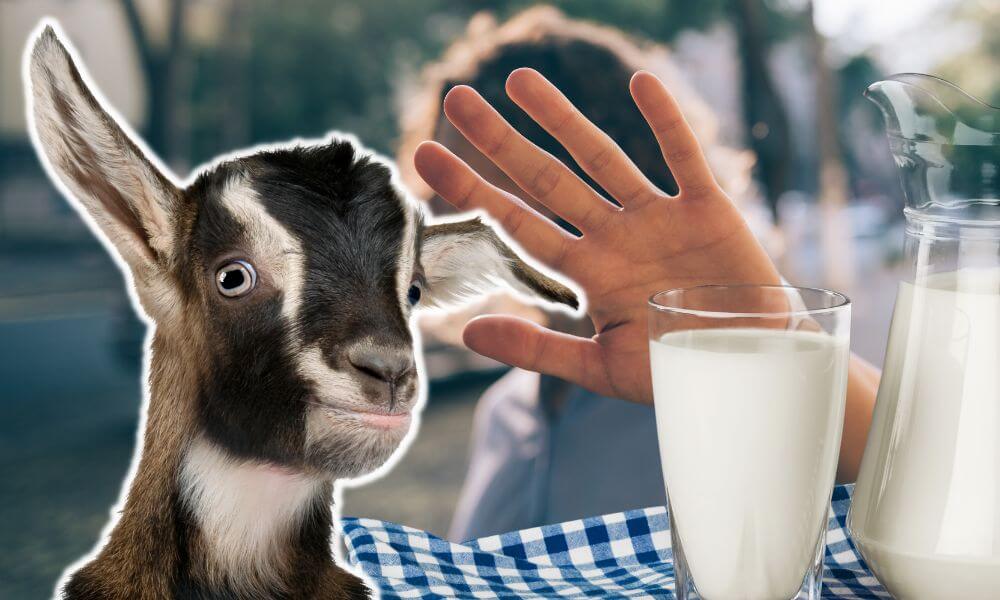For a lot of people, it is not uncommon to develop an intolerance to lactose later on in their lives.
Often it happens in your late teens and early twenties.
It’s never a good thing to happen when dairy products are such a cornerstone of our diets.
I found myself in this unfortunate position recently, after a conversation with my doctor.
She advised me against eating anything containing lactose anymore.
This was really hard for me to hear, and while I was in the ‘denial’ stage of grief, I looked into alternatives, and wondered whether goat’s milk contains lactose.
So, I looked into it.
Does goat’s milk contain lactose?
Yes, goat’s milk contains lactose in essentially the same quantities as cow’s milk. Levels of lactose tolerance can vary enormously between individuals, so it may be that some people find goat’s milk easier to digest than cow’s milk. If you are lactose intolerant, though, you should stay away from goat’s milk.
Lactose is present in all forms of dairy milk.
It’s a type of sugar that most mammals lack the necessary enzyme to break down.
We are included in that, despite the fact that dairy has been a staple of human diets in one place or another for more than 10,000 years.
This is why so many of us are lactose intolerant.

Can I have goat’s milk if I’m lactose intolerant?
To put it simply, no, you can’t.
In some cases, goat’s milk will contain less lactose than the more commonly consumed cow’s milk.
If you have severe lactose intolerance, you should stay away from goat’s milk.
It still contains enough to cause you great discomfort and even for those with only a mild intolerance, you still will not feel good after eating it.
According to some research, goat’s milk contains around 12% less lactose per cup than cow’s milk.
This is only a ballpark figure, though, as the concentration of lactose in a cup of milk will vary depending on a few other factors like the breed of goat or where the cow was raised for the milk.
There are some lactose-free dairy milks which are processed in order to further reduce the quantity of lactose.
This will be your best bet if you can’t do without dairy milk but can’t tolerate lactose.
Does goat’s cheese contain lactose?
Definitely in my case and I know for many people who suffer from the same condition as me, the one thing they really miss with all their heart is cheese.
Goat’s cheese, in particular, has been a popular artisanal product for many years enjoyed by countless people.
So, it’s with a heavy heart that I inform you goat’s cheese contains all the same lactose that goat’s milk does.
Again, goat’s milk, and by extension goat’s cheese, does contain significant amounts of lactose, though comparatively less than cow’s milk.
It usually is not enough to make a difference, unfortunately; you’re still likely to cause havoc for yourself if you eat goat’s cheese.
In general, hard cheeses like parmesan and cheddar cheeses have lower concentrations of lactose than soft cheeses like mozzarella or camembert.
Given that tolerance to lactose can be very individual even among the lactose intolerance, you may well be able to find a cheese you can handle.
Find a hard goat’s cheese and give it a try.
If you don’t react well to it, try a plant-based cheese instead.
| Related Articles |
|---|
What is the healthiest milk for humans?
The unfortunate answer to this question is that most dairy milks are not especially healthy for us as we get older.
In recent years, there’s been a huge shift towards plant-based milks that don’t require goats or cows, or any milking animal.
Plant based milks like soya and almond milk have been popular for centuries (though, admittedly, more commonly as a ingredient than a drink), and now there are more choices than ever.
The data is quite clear: plant-based milks are healthier for us than dairy milks.
Based on nutrient quality, hemp milk actually seems to be one of the healthiest milks available. In only 60 calories, it contains 3 grams of protein, 5 grams of fat, and plenty of calcium, magnesium and iron.
It is less commonly available, though, admittedly.
My personal favorite is oat milk.
It’s naturally sweet and high in carbs, and soluble fiber which makes it creamier.
This can also help to reduce cholesterol levels.
It is slightly higher in calories than hemp milk, however.
Almond milk is another very popular milk and is even simple to make at home yourself, with just almonds, water and a blender.
It’s lower in calories than cow’s milk and contains a lot more carbs, making it a good choice for lower carb diets.
Soy milk has definitely been the most popular over the years.
It is possibly the closest to cow’s milk in terms of nutrition.
In an 8-ounce serving, soy milk contains 6 grams of protein and 12 grams of carbs in only 105 calories, not to mention its high calcium content and mineral content.
Organic soy milk may be your best option in terms of replicating the dietary benefits of cow’s milk in your diet.
Of course, it goes without saying that no plant-based milk contains lactose.
As I said, lactose is a sugar used to support the early growth of baby mammals.
You’ll never find it any plant-based milks.
So, if you were looking for an animal based, lactose-free milk, it unfortunately does not exist.
But there’s no reason to despair.
There are countless plant-based options available that taste just as good and are in many ways a lot healthier than goat’s milk or cow’s milk.
Take the time to find one that suits you and you’ll soon forget you were ever worried about losing goat’s milk.
